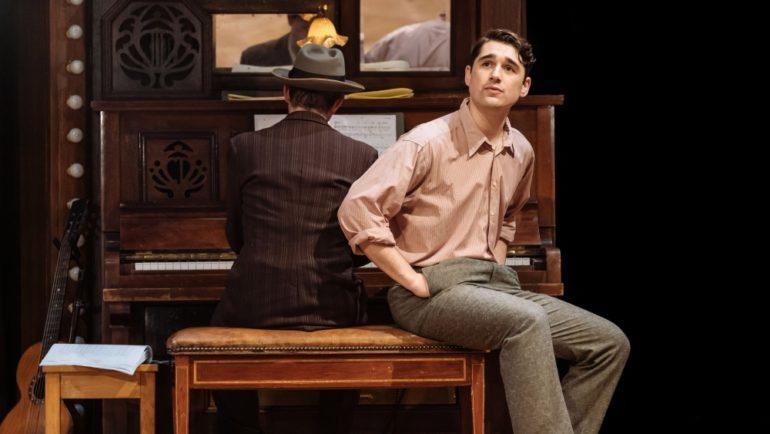London Theater Review: ‘The American Clock’
By Matt Trueman
LOS ANGELES (Variety.com) – Time is money. Money is time. Both come unstuck in “The American Clock.” Arthur Miller’s kaleidoscopic account of the Great Depression, part autobiography, part social history, crawls through the decade after the Wall Street crash, dishing up snapshots of daily life. In the Old Vic’s classy revival, director Rachel Chavkin (“Hadestown”) tunes into the play’s rhythms, and you feel the freeze of an economic slowdown. A show that starts with brokers counting their stocks ends with a nation watching the clock, waiting for something — anything — to give. It’s as if money loses all meaning and time grinds to a stop. A decade after our own financial crash, “The American Clock” chimes ominously true.
Even so, today’s troubles are nothing on the dog days Miller describes. His slices of 1930s life show the sheer extent of the deprivation the Depression brought about. Writing in 1980, Miller fused his own memories of the era as a teenage boy — he was just 14 when Wall Street went down — with scenes lifted from Studs Terkel’s oral history “Hard Times,” and stitched them into an old-school vaudeville show. It feels fragmented, like America’s coming apart at the seams and, as the Depression deepens, Miller draws an analogy with a decade-long dance marathon as conked-out couples compete just to stay on their feet.
It is an economic endurance test, exhausting and out of juice, and by showing it unfolding, day by day, year by year, Miller escapes the stock imagery: sandwich boards, soup kitchens, breadlines and so on. If his proxy family, the Baums, escape the worst, they still feel hardship and by casting them in triplicate — one white Jewish household, one South Asian and one African-American — Chavkin acknowledges that economics aren’t equal. Some demographics are hit harder than others.
But what starts as a disruption — men giving up chauffeurs, housewives tightening their belts — soon settles into a drawn-out decade of despair. What’s startling is the speed with which it just settles in. The first figures seen “flying spread-eagled” from skyscrapers are shocking. The second, third, fourth become more and more routine. Miller makes the madness in that clear and he writes, carefully, about a time turned inside out, swinging from the personal to the political and showing that an investor’s lost stocks and a teenage boy’s stolen bike can exist on a par. Before long, nothing much makes sense: CEOs tap dance their days away, adults survive on chocolate bars and breast milk and Clarke Peters’ suave stockbroker advises his clients to buy bars of gold for their basement.
Fresh from the Broadway-bound “” up the road at the National , Chavkin’s production piles on the pizzazz. On Chloe Lamford’s ever revolving stage — a stock market floor that falls into a spin — An Yee’s manic, zany choreography strikes a note of ironic glee, as if toothsome smiles and jazz hands might prove optimistic enough to restore market confidence. Instead, the remixed retro soundtrack, which skips and scratches through old crooner classics, grows twitchy and dizzy as it slides out of tune. Even so, it’s not quite enough to make Miller’s scenes spark. They have their moments, individual images linger in the mind, but just like the Roaring Twenties, the fizz goes flat.
That’s partly by accident, partly by design, and Chavkin’s keenly attuned to the play’s use of pace. She swerves from the pep of “The Sunny Side of the Street to the wheeze of “Down and Out,” from the excitement of an economy that keeps going up to the emptiness of one that has hit a flatline. Queues for state handouts stretch out all day, getting tetchy, and card games go on forever, kept quiet in case the debt collectors come by.
Days yawn, years go missing – not least for the young, who postpone college, pick degrees according to discounts and give up on even the idea of a career. Almost without anyone noticing, suit jackets unstitch, shoes lose their shine and shirts fade. Eyes slip to the ground as shame — and worse, starvation — starts to set in. It is as if America wears itself threadbare: “It can’t go on forever,” Mr. Baum bursts out. “A country can’t just die!” Perhaps it just runs out of time.

